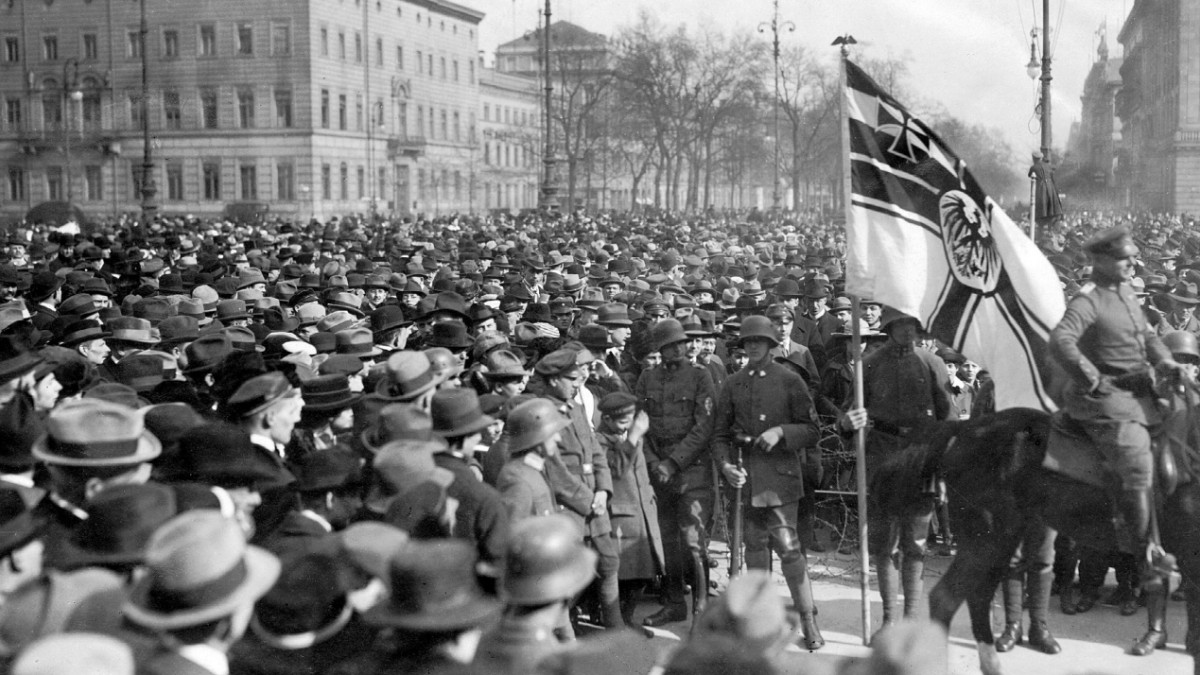Kapp and Lüttwitz triumphant!
Kapp and Lüttwitz triumphant!

"On the field of Döberitz, the 2nd Marine Brigade under its leader Captain Ehrhardt stands in the adornment of arms. A core troop of the best kind, proven in battle against the external and internal enemy. Firmly bound in patriotism, discipline, comradeship and loyalty to its leader, the brigade has rendered invaluable, selfless services to the present government in maintaining order on its march from Wilhelmshaven via Berlin, Brunswick, Munich to Upper Silesia. On 17 February it had existed for one year. Today the government, feeling secure, intends to dissolve it! On 1 March, Excellency von Lüttwitz and Excellency von Trotha held the parade to mark the anniversary of the foundation. The assault company, the battalions, artillery, machine-gun and mine-thrower platoons passed by in excellent condition, with music playing and flags waving. Then field service under a blue spring sky, just like in the old days. In the afternoon a folk festival and in the evening a happy get-together, everything as it used to be. Even the weather, Hohenzollern weather!"
Deutsche Zeitung, 4 March 1920. "One thing is already certain, however, that certain circles were working according to plan towards "the day", the day of the counter-revolution. Unscrupulous capitalist and militarist actors, fully aware of their responsibility, spun the web of counter-revolution in whose meshes they finally entangled the German people. They used the strong party-political antagonisms for their dark work, and they endeavoured in particular to attract those officer circles who had considered themselves declassed since November 9, 1918, and who were further strengthened in this view by an irresponsible press agitation from the right. The planned counter-revolution was to be a counter-revolution of revanchism. Perhaps, however, the ulcer of the counter-revolution would still have been cleared up. With a progressive recovery of our national body, the poisonous counter-revolutionary juices would perhaps have been excreted naturally, if a coincidence of events had not suddenly offered those who were waiting to strike out an opportunity to strike out. The Marine Brigade Ehrhardt, which had been used against our comrades in March 1919 and parts of which had later murdered in the Baltic, was to be disbanded. In this force, as in other units of the Reichswehr, the selection of officers and enlisted men had been made with regard to possible planned events. The peace treaty, which provided for the reduction of the army, always offered an outward pretext for eliminating those on whom one believed one could not rely. Now, when the dissolution of the so-called troop section was really taken seriously, the conflict was there, and this conflict was used for the big blow."
Die Freiheit (Newspaper of USPD), 25 March 1920, issue censored and never published. Comrade, reach out to me,
Let us stand firm together.
No matter how they fight us,
The spirit shall never fade.
CHORUS:
Swastika on the steel helmet,
Black-white-red the ribbon,
The Ehrhardt Brigade
We are called.
Proudly we wear the stars
And our skull and bones,
Viking ship on our sleeve,
Emperor's crown in our button.
CHORUS
We have also been betrayed,
They toyed with us and played tricks on us,
We knew what we were doing,
Remained loyal to the fatherland.
CHORUS
Soon you too will realise,
What you have lost in us.
Comrade, join hands with me,
Keep what we once swore to each other.
CHORUS
Ehrhardt's spirit in the heart
Cannot perish,
The Ehrhardt Brigade
Will one day rise again.
Battle song of the Ehrhardt Brigade, 1920.



